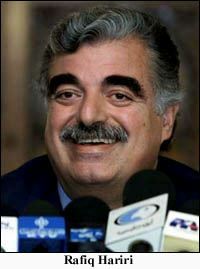 |
| Vol. 4 No. 2 | Table of Contents MEIB Main Page | February 2002 |
Al-Qa'ida Reportedly Attempting to Transfer Base to Lebanon
According to a February 1 report in the London Times, the Al-Qa'ida terrorist network is attempting to transfer its base of operations to Lebanon. The paper cited British intelligence sources as saying that a senior Al-Qa'ida official, a Yemeni national known by the alias Salah Hajir, arrived in Lebanon in mid-January and is believed to have met with leaders of the Sunni Islamist group Usbat al-Ansar, which is based in the Ain al-Hilweh Palestinian refugee camp in Sidon. The paper said that a number of Usbat al-Ansar operatives who fought alongside Osama bin Laden in Afghanistan have recently returned to Lebanon. There have been a number of subsequent reports, citing Israeli intelligence sources, that members of Al-Qa'ida have taken refuge in Ain al-Hilweh.
According to the London Times report, Hajir also met with leaders of the Shi'ite Islamist group Hezbollah. The group has not cooperated closely with Al-Qa'ida in the past and Hezbollah leaders have condemned the September 11 attacks as un-Islamic. However, there have been reports that bin Laden met with a senior Hezbollah leader in the early 1990s and that Hezbollah provided the Al-Qa'ida network with explosives and training.
NSA Aide Outlines American Position on Hezbollah
According to a February 14 report in the Lebanese daily Al-Nahar, an assistant to US National Security Advisor Condoleezza Rice recently conveyed the Bush administration's position regarding Hezbollah to Lebanon's ambassador in Washington, Farid Abboud. According to the report, Deputy National Security Advisor Stephen Hadley highlighted the following points:
"Afghan Hezbollah" Trained in Lebanon
On February 22, the Washington Times cited American officials as saying that Hezbollah trained a group of 200-300 Afghan Shi'ite fighters, who have infiltrated Afghanistan from Iran in recent weeks and are now based in the area around Mazar-e-Sharif. The group, called Sipha-e-Mohammed, is also known as "Afghan Hezbollah."
Hezbollah AA Barrages Hit Northern Israel
On January 31, Hezbollah launched the first of several barrages of large caliber anti-aircraft rounds into the air above northern Israel, showering shell fragments on residential areas of the upper Galilee, causing some damage but no casualties. The anti-aircraft fire was ostensibly directed at Israeli air craft violating Lebanese air space, but the 57mm shells were doctored so as to explode in mid-air and drop shrapnel over large areas below, sending thousands of residents into bomb shelters. The latest anti-aircraft barrage took place on the night of February 17.
The attacks are intended to pressure the Israelis into ending surveillance flights over south Lebanon, which are closely monitoring Hezbollah's construction of extensive anti-tank defenses and deployment of thousands of new Katyusha rockets received from Iran in recent months. "Let them stop intruding and we will cease firing," said Hezbollah Secretary-General Hassan Nasrallah in an interview with the Al-Jazeera satellite TV network on February 14.
 |
Murr Vows to Destroy Drug Fields
Interior Minister Elias Murr pledged on February 15 that Lebanese security forces would destroy illicit drug crops that have rapidly proliferated in the Beqaa Valley. "I want to say before all the media that I have summoned all senior officers and ordered them to start by the end of the month destroying all drugs and opium fields in all Lebanese regions without exception," said Murr. Days later, security forces claimed to have seized around 6,000 kg (13,200 lbs) of hashish during a raid on a warehouse in Mushrafiyeh, a village 17 km (10.5 miles) northwest of the city of Baalbeck. On February 1, police reportedly seized 2,500 kg (5,510 lbs) of hashish and 3,500 kg (7,716 lbs) of hashish seeds in the village of Barqa, 15 km (9 miles) northwest of Baalbeck.
The Syrian-controlled Beqaa Valley was a major source of illicit cannabis and opium production during the war years from 1975-1990. Although a major crackdown led to a dramatic reduction in the 1990s, the economic recession in Lebanon has led many farmers to revert to drug production during the last year [see The Revival of Lebanon's Drug Trade, June 2001].
Don't Drink the Water in Lebanon
Local press reports earlier this month cited scientists at the American University of Beirut as saying that most local supplies of water in Lebanon are contaminated with harmful chemicals or bacteria. Energy and Water Minister Muhammad Abd al-Hamid Beydoun recently acknowledged that only 10 of 800 private water suppliers are licensed by his ministry. During a parliamentary conference on management of water resources on February 13, the head of the engineering department at the Beirut Water Authority (BWA), Farid Karam, said that the BWA "does not perform regular check ups on water running through our pipes. Rather, we perform tests on samples of water that we suspect is polluted or has caused people to get sick."
The comments by Beydoun and Karam prompted the English language Daily Star to write that "even those long accustomed to governmental dysfunction have to shake their heads in astonishment."
Lebanon's Balance of Payments Worst in History
According to Central Bank statistics cited in the local press, Lebanon's balance of payments in 2001 reached a record deficit of $1.17 billion, nearly four times the figure for 2000, $289 million. Officials at Banque du Liban said that the figure is due mainly to a 16% increase in the balance of trade deficit to $6.4 billion.